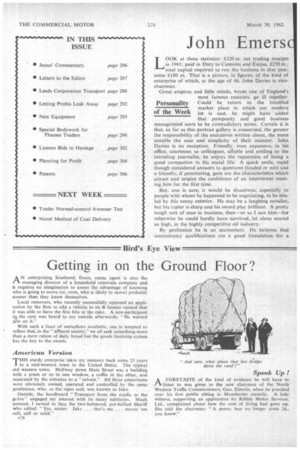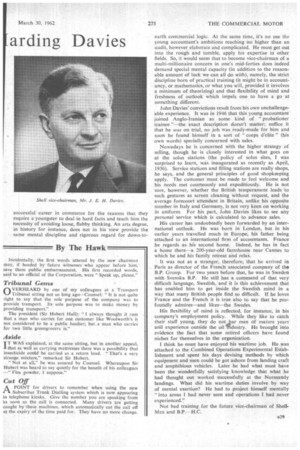00K at these statistics: £320 m. net trading receipts in
Page 36

Page 37

If you've noticed an error in this article please click here to report it so we can fix it.
1961; paid in Duty. to Customs and Excise, £250 m., total capital required to run the business in that year, some £180 That is a picture, in figures, of the kind of enterprise of which, at the age of 46, John Davies is vicechairman.
Great empires and little minds, wrote one of England's most famous essayists, go ill together. Could he return to the troubled market • place in which our modern lot is cast, he might have added that pomposity and good business management seem 'to be contradictory terms. Certain it is that, so far as this portrait gallery is concerned, the greater the responsibility of the executives written about, the more notable the ease and simplicity of their manner. John Davies is no exception. Friendly, even expansive, in his office, courteous to colleagues, affable and smiling to the intruding journalist, he enjoys the reputation of being a good companion in his social life. A quick smile, rapid though considered answers to questions .(loaded or not) and a friendly, if penetrating, gaze are the characteristics which attract and inspire the confidence of an interviewer meeting him for the first time.
But, one is sure, it would be disastrous, especially to people with whom he happened to be negotiating, to be misled by this sunny exterior. He may be a laughing cavalier, hut his rapier is sharp and his sword play brilliant. A pretty tough sort of man in business, then—or so I saw him—for otherwise he could hardly have survived, let alone soared so high, in the highly competitive oil industry.
By profession he is an accountant. He believes that accountancy qualifications are a good foundation for a
Personality of the Week
successful career in commerce for the reasons that they require a youngster to deal in hard facts and teach him the necessity of avoiding loose, flabby thinking. An arts degree, in history for instance, does not in his view provide the same mental discipline and rigorous regard for down-to earth commercial logic. At the same time, it's no use the young accountant's ambitions reaching no higher than an audit, however elaborate and complicated. He must get out into the rough and tumble, apply his expertise in other fields. So, it would seem that to become vice-chairman of a multi-millionaire concern in one's mid-forties does indeed demand special mental capacity (in addition to the reasonable amount of luck we can all do with), namely, the strict discipline born of practical training (it might be in accountancy, or mathematics, or what you will, provided it involves a minimum of theorizing) and that flexibility of mind and freshness of outlook which impels one to have a go at something different.
John Davies' convictions result from his own unchallengeable experience. It was in 1946 that this young accountant joined Anglo-Iranian as some kind of "probationer trainee "—the exact description doesn't matter; suffice it that he was on trial, no job was ready-made for him and soon he found himself in a sort of "corps d'elite " (his own words) specially concerned with sales.
Nowadays he is concerned with the higher strategy of selling, though he is closely interested in what goes on at the solus stations (the policy of solus sites, I was surprised to learn, was inaugurated as recently as April, 1956). Service stations and filling stations are really shops, he says, and the general principles of good shopkeeping apply. The customer must be made to feel welcome and his 'needs met courteously and expeditiously. He is not sure, however, whether the British temperament leads to such gestures as screen cleaning without request, and the average forecourt attendant in Britain, unlike his opposite number in Italy and Germany, is not very keen on working in uniform. For his part, John Davies likes to see any personal service which is calculated to advance sales.
His career has undoubtedly been forwarded by an international outlook. He was born in London, but in his earlier years travelled much in Europe, his father being attached to an international firm of accountants. France he regards as his second home. Indeed, he has in fact a home there—a 200-year-old farmhouse near Cannes to which he and his family retreat and relax.
It was not as a stranger, therefore, that he arrived in Paris as director of the French associated company of the B.F. Group. For two years before that, he was in Sweden with Svenska B.F. He still has a command of that very difficult language, Swedish, and it is this achievement that has enabled him to get inside the Swedish mind in a way that many British people find so difficult. If he loves France and the French it is true also to say that he profoundly admires—and likes—the Swedes.
His flexibility of mind is reflected, for instance, in his company's employment policy. While they like to catch their staff young, they do notliar men of mature years arid experience outside the oil 7Edustry. He brought into evidence the fact that some retired officers have found niches for themselves in the organization.
I think he must have enjoyed his wartime job. He was attached to the Combined Operations Experimental Establishment and spent his days devising methods by which equipment and men could be got ashore from landing craft and amphibious vehicles. Later he had what must have been the wonderfully satisfying knowledge that what he had thought out worked successfully at the Normandy landings. What did his wartime duties involve by way of mental exertion? He had to project himself mentally
into areas I had never seen and operations I had never experienced.'
Not bad training for the future vice-chairman of ShellMex and B.P.-11.C.
































































































































